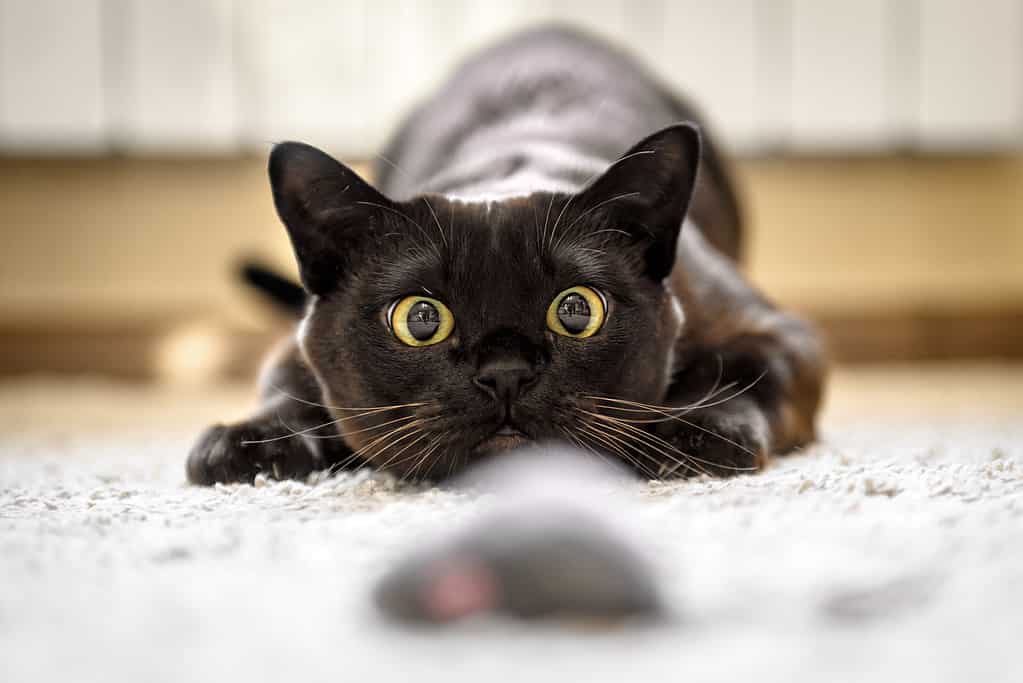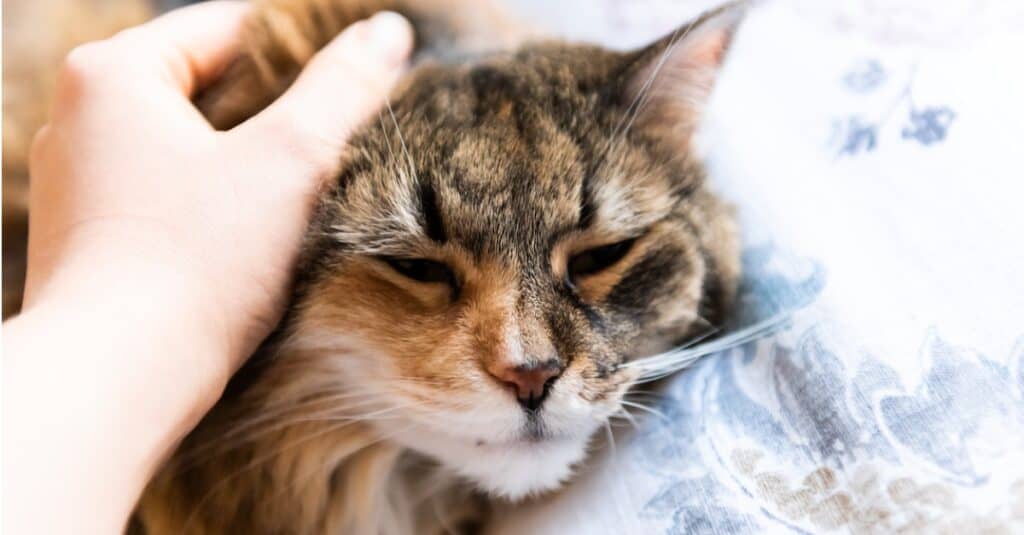Clean cats love feeling well groomed, but inside their ears is a place they struggle to keep clean. Wax build-up can cause stickiness, irritation, and deafness, so helping out your cat will them bring relief. Cleaning your cat’s ears also allows you to check for mites, cancer, infections, and wounds. However, ears are delicate constructions, and many recommended homemade cat ear cleaners aren’t suitable. They can even cause further irritation.
Let’s take a look at the best homemade cat ear cleaners and the not-so-great ones, too.

Warm olive oil is the best homemade cat ear cleaner.
©scaliger/iStock via Getty Images
The Best Cat Ear Cleaner Is Olive Oil
Olive oil, or a gentle, pure vegetable oil like coconut, sunflower, or rapeseed, is the best homemade cat ear cleaner because it gently unsticks wax and doesn’t contain astringents or alcohol that can irritate their delicate ear lining.
How To Use Olive Oil To Clean Your Cat’s Ears

Olive oil unsticks ear wax and clings to debris in the outer ear.
©daphnusia/iStock via Getty Images
Depending on your cat’s temperament, you may have to create a kitty burrito first. That’s simply wrapping your cat in a towel so they can’t bite or scratch you. Many cats enjoy an ear rub, so massaging in a few drops of oil isn’t always a problem. Only you know how your cat might react.
- Firstly, warm the oil. Cats are much more receptive to body temperature oil than cold! Don’t use the microwave, as this creates hot spots that can burn skin. Instead, stand a small container of oil in hot water to warm through.
- Pop two drops of oil into your cat’s ear and gently rub it in straight away. Oil clings to wax and even ear mites, so let the oil work its magic for a few minutes. Rub your cat’s ear at the base between your finger and thumb straight away to stop them from shaking it out, which is usually their first reaction.
- Then, gently sweep inside the ear with a muslin cloth or cotton wool pad to remove the unstuck wax and debris. Don’t use damaging Q-tips or cotton wool balls that leave behind pieces of fluff. Never, ever push Q-tips or a finger into your cat’s ear because it can rupture their eardrum.
- Offer a treat so Kitty associates ear cleaning time with something tasty.
What Not To Clean Your Cat’s Ears With

Hydrogen peroxide is too strong and astringent for cats’ delicate ears.
©John Kevin/Shutterstock.com
The PDSA suggests olive oil as a homemade cat ear cleaner. However, many other websites typically suggest a water/vinegar mix, witch hazel, baby wipes, or hydrogen peroxide, too. Are they safe for a cat’s ears?
No.
Let’s take a closer look at why you should only use olive oil in your cat’s ears.
Hydrogen Peroxide and Purified Water
Hydrogen peroxide is a wound cleaner, disinfectant, and stain fighter. It’s got a whole lot of applications around the home, and many of us remember it on our grazed knees.
The problem is, we remember that because it stings, and that’s the main problem with hydrogen peroxide in cat ears. It stings any small wounds, scratches, or sore areas there.
It’s also too drying to put in an ear canal. Wax exists to stop debris and infection from reaching the inner ear; it’s sticky for a good reason! Hydrogen peroxide dries out the wax, and this can lead to itchy, dry skin and even infections.
Water and Cider Apple Vinegar
Vinegar is a great cleaner, smell remover, and antiseptic, but it’s not a good choice to clean cat ears.
Much like hydrogen peroxide, it is just too strong. Even when it’s diluted, vinegar stings small cuts and sore areas, causing pain and distress. Not only is this uncomfortable for Tiddles, but she’ll remember that distinctive smell. Next ear cleaning time, you won’t see her for dust.
Witch Hazel

Witch hazel, baby wipes, and vinegar are not good homemade cat ear cleaners.
©Kristi Blokhin/Shutterstock.com
Witch hazel, known as hamamelis water, is derived from the bark and foliage of the Hamamelis “witch hazel” plant. It’s an excellent antiseptic for our cuts, and helps reduce inflammation too, but is too strong and astringent for a cat’s delicate ears. It’ll sting, smell, and dry out ear skin, potentially causing more problems than it solves.
Baby Wipes
Fragranced baby wipes are not suitable for cat ears because their fragrance can irritate the ear’s delicate membranes. There’s also an issue with certain chemicals that are toxic to cats, who invariably groom the scent from their fur as soon as possible. Just because something is baby-safe does not mean it is cat-safe.
When To See A Vet
Mucky ears are pretty uncommon in cats, and it can often mean there’s an underlying problem such as mites, a wound, or an infection. It’s best to check with your vet before using anything, even mild olive oil, on a cat that’s shaking its head, over-scratching, or has a funky ear smell. If you put liquids on top of an infection, it makes the situation worse for your cat and your bank account.
Best Homemade Cat Ear Cleaner: Olive Oil

Just one or two drops of olive oil are enough to clean your cat’s ears.
©Kashaeva Irina/Shutterstock.com
Olive oil is the best homemade cat ear cleaner. It gently lifts wax and debris without stinging small cuts or drying out the ear canal. It’s also scent-free, so your cat won’t be upset by strong smells and fight the ear-cleaning process. You only need one or two drops, followed by a gentle ear rub, to dislodge wax and debris.
However, what olive oil cannot do is get rid of ear mites or deal with an ear infection, whether it’s on the outer ear or deeper in the ear canal. For those situations, you need to see a veterinarian as soon as possible.
If Tiddles has waxy ears that require ear cleaning more than once a month or so, it’s best to get checked out with the vet because, in general, cats shouldn’t need frequent ear cleaning.
The photo featured at the top of this post is © Lubo Ivanko/iStock via Getty Images
Thank you for reading! Have some feedback for us? Contact the AZ Animals editorial team.







